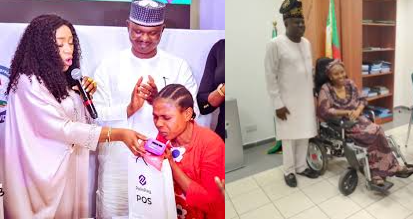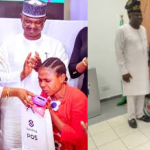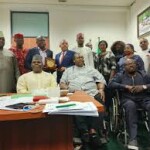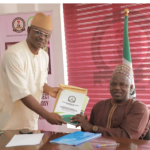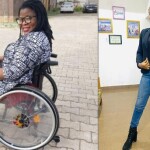The NCPWD has become a huge mass of sleaze—behind its mask of an underdog, and its executive secretary’s impunity.
By Elijah Olusegun
Studying his lecture materials on Modernization Theories of Development (POL 122), Yomi sweated it during his 100 level at UNILAG, Lagos. His screen-reader rapped to him theories and postulations of Karl Marx and Max Weber. With braille, he could read and discern the definitive works of these past social science juggernauts. But he couldn’t differentiate one Max from the other while the reading app droned on.
“I had to read over and over. Or asked somebody to spell out the names for me,” he told ER.
That was 2021. That year, the National Commission for Person With Disabilities (NCPWD), under its Executive Secretary James Lalu, started its own budgeting. It voted N20 million annually, for the three years that followed, back to back, for establishing braille presses across the nation.
Yomi learnt to use braille when he was in secondary school. Now he can explain the benefits of using the latest digital system that converts regular text to braille. Except that it’s beyond his reach. “I have never benefitted from anything braille press like what the disability commission says it’s budgeting for,” he said.
The chairman of the state’s Nigeria Association of the Blind (NAB) doesn’t have an idea, either. “There’s no functional government-owned press in Lagos,” he said during a recent launch of a braille press. An individual donated it to the association’s state chapter. The moribund government press, if there is one, must have been established by an agency other than the NCPWD. An official of the Ondo chapter of the same association could not locate any the commission established in his state. Similar reactions came from other states across the southwest—and other five geopolitical zones, too.
But in its paper trail on the Nigerian treasury portal , the commission indicated it procured one. No record of when it did, and where. The amount it stated, and the contractor it awarded the braille project provoked further scrutiny. And the finding, in a sum, is not cheery: the accountability engine in Lalu’s administration seems in disable mode; and the gaffer acts like he has an excuse for that.
He does.
The Termite
The commission, a creature of the Discrimination Act 2018, operates outside the law that established it. Any crook can exploit that gray zone. House Committee on Disability Chairman Hon. Bashir Dawodu told ER they are not unaware of this.
It turned out the braille contract was just a tip of the iceberg. The NCPWD once paid a security guard company N7m for a one-time service not budgeted for. On the commission books, only 11, out of the 69 contracts it budgeted for since 2021, had their scanty records of invitations to tender; only three, including the braille contract awarded without bidding, had their records of payment released on the federal government treasury (open contracting) portal. The commission did these in defiance of the Public Procurement Act 2007 which generally provides for optimal transparency and value for taxpayers’ money.
Lalu and the commission’s procurement office ignored ER requests for clarification on funds the government released for the NCPWD budgets in those three years. In question here was the N1.3bn the commission spent on 11 contracts it advertised for bidding in 2022, the successful bidders, their competences, experiences, and other details. For transparency’s sake, the Act’s Special Procurement Notice demands the commission publish the bidding process in two national newspapers, the Federal Tender Journal, government gazettes, and on the NCPWD website. The commission, however, chose to publish only the invitation to tender on two e-tender platforms. One boasts 25000 visits monthly.
But data available in its yearly budgets from the federal budget office reveals the braille contract, again, was one of five budget items which have been ongoing since 2021. Others included provision of digital disability certificates. Heads of disability clusters and NGO officials ER interviewed in Lagos and Abuja said they haven’t seen any, despite the N70m the commission budgeted for it in 2021, the N50m in 2022, and the N20m in 2023; Gender and Development Training for Women with Disabilities which got N185 million earmarked in the three years; Special Intervention on Accessibility Facilities got N95m in the same period; Bulk Purchase of Assistive Technology Devices got N416m; Data Collection got N170m; and Sign Language Development Programmes, N90m in the first-two years only. The largest votes for these projects—N170m for gender development, N170m for Data Collection, and N310m for assistive devices—came in 2022. That was the year the commission budgeted the highest so far: N3.1bn, out of which it committed N2bn to capital projects.
On these seven eternally ongoing projects voted N1.2bn in three years, the commission keeps the PWDs in the dark. No records of contractors, invitations to tender, bidding process, and payments. And in all its procurements in three years, only four contractors can be identified: Kojo Motors Ltd, which supplied two Hilux vehicles for which the commission budgeted N100m, got paid N17.3m and N8.9m in 2021; DAPS Global Security Ltd, a Plateau-based company, got paid N7.8m in 2022 for providing a one-off security service unbudgeted for. No bidding carried out for these contracts. And neither of the contractors registered with the federal government. The Bureau of Public Procurement (BPP) demands both conditions, and many others, too. The other two—Henfeh Oyinlola Nigeria Ltd and Kamdez Integrated Solution—won the contract awards also through some under-the-table deals.
Sleaze of Commission
Kamdez, a three-man company, has raked in 26 contracts so far. The projects range from civil engineering to advocacy and empowerment. The procuring MDAs include the NDLEA, the refugee commission, UBEC, and others. According to the record available on the government treasury portal, it was the same company Lalu awarded a PWD empowerment contract in Isiala/Okigwe/Onuimo/Mbaino federal consistency in Imo in 2022.
The House Committee chairman on disability affairs then was Maryam Onuoha. She also represented that particular federal constituency. No fewer than six NCPWD projects actually fell to her constituency that year. Among them were a road rehabilitation project, training of graduates and women with disabilities in travel agency management, a grant to women and youth with disabilities, another to indigent PWDs, and supply of items and assistive devices.
The commission published all six, and five other projects—in an invitation to tender in June 2022. Section 16, subsection 4b of the Public Procurement Act (PPA) states: “No procurement proceeding shall be formalized until the procuring entity has ensured that funds are available to meet the obligations.” That then confirmed the commission had funding, at least N1.3bn, ready for the 11 projects it advertised. But that was how far the commission’s transparency went. Details of successful bidders, the contract awards, the amounts it paid remain under the lid.
If anything, the nature of the only four contractors the commission had reason to publish hinted at what other successful contractors off the book looked like. It also let out a bit of what the commission is now hiding.
Henfeh Oyinlola Ltd, founded in 2009 with RC No 831023, has no employee, according to a search on the Corporate Affairs Commission. But the disability commission gave it the braille production contract (only God knows when), and paid it N16.7m in December 2022. The amount the commission budgeted was N20m.
ER traced the contractor’s office addresses. The one on its BPP registration detail is in the middle of nowhere: No 8 ‘Lugbe Street’, Abuja. The other on the CAC database—Plot 1056 Ladi Kwali St, Nitel Junction, Wuse 2, Abuja—lacks bearing. The house number doesn’t exist, and neighbours said there is no company by that name anywhere around. The only person the CAC lists as having significant control of Henfeh, Faru Lawal Mohammed, included his email service, to which ER sent an enquiry. The other email listed on BPP got the same request—for clarification on the contract fee, the amount the commission paid his company, and other discrepancies. Neither of the owners replied.
Going by the BPP qualification, Henfeh doesn’t belong in any of the bureau’s categories. In other words, it lacks the competence for the project Lalu gifted it. What is thus left to expect of its execution is better imagined.
And here is an image: In December 2021, Lalu invited his then-supervising Minister of Humanitarian Affairs Aisha Sadiq Farouk to commission a braille press centre, a digital certificate production centre, and a National Data Processing Centre. All the three rolled up in one, and planted on the NCPWD premises in Abuja. In the explosion of tributes that attended the launch, Lalu got really lyrical. “Thank you for wiping the tears of over 21 million PWDs in Nigeria, and for using your office to provide for the PWDs,” he told the minister. (His current boss Betta Edu enjoys no less)
But none of these facilities has produced anything.
Able Buddies
Accountability Lab made a point of Nigerian PWDs’ widespread lack of access to public infrastructure in October. Its programme officer Mnenga Shiiwua, co-hosted with the NCPWD planning director Soji Adewale during a radio programme in Abuja, linked accessibility and database. However, for now, with N170m the commission budgeted in three years, the PWDs still don’t know how many they are. None of them knows the color of the disability certificates the centre produces and issues. And the braille centre has never cranked out any reading material.
Worst of all, Lalu refused to account for their procurement—either by making available the details on government open contracting portals, or by answering ER questions seeking clarifications, especially about the contractors, the bidding process, and how much the commission paid them. But Henfeh, for sure, got N16.7m in 2022.
The same way Kamdez did.
The multipurpose company’s category and competence, according to the BPP, fits into only goods and small works. Not services. Nor major works. But with its two directors and three employees, the company got paid for no fewer than 10 consultancy service and advocacy contracts it allegedly executed. Then came 16 other contract awards. Apart from those earlier listed, others of its clients are the National Institute of Culture and Orientation, the Border Community Agency, the Federal Ministry of Education, and the NCPWD.
Kamdez’ Abuja headquarters at 69b, Gwarimpa Road, which it registered with the BPP, cannot be traced; but its reach went as far as Plateau, Cross Rivers, Imo and other states across the nation.
Udueze Yonnem Ndudi and Udueze Chigbogu Emmanuel, the two persons with significant control of the company, have no verifiable contact on the CAC database and the BPP’s. Invisible as they are, the Uduezes run one other company, Endez Farms Ltd. The same has been bagging contracts from the federal government. The two companies run their business out of a single office at a Plaza in Federal Housing Estate, Tran-Ekulu, Enugu.
Kamdez ended up hogging 98 percent of the contracts the federal government awarded between February 2022 and June 2023. The company, founded in 2016, received N697, 161,776.70, out of the N707, 610, 514.30 government paid for small works within that period in the document on the treasury portal. Yet the BPP has no record—it indicates zero in the space for number of contracts won—of Kamdez ever bidding or winning any contract. ER asked for clarification in a request to the email Kamdez made available on the BPP portal. There was no response as of the time of publishing this report.
In its breakdown, the record showed the NCPWD budgeted N74m for the empowerment programme in Hon. Onuoha’s constituency in 2022. Kamdez snagged it—and got N46.3m in April 2023. The company’s experience, competence, and capabilities didn’t matter to the commission.
The PPA Special Instruction to Tenderers refers to this as fraud—“a misrepresentation or omission of facts in order to influence a procurement process”. The Act punishes offender—contractors or government officials— with between five years and 10 years jail time. But the BPP played the willing collaborator.
In this and other contract awards, the twosome (the BPP and the commission) broadly violated the PPA and the Discrimination Act, especially its section 38 mandating the NCPWD to issue disability certificates, and set up a national database, among its 18 responsibilities.
Disabled Commission
With this sort of violation, the commission cannot carry out needs assessment for most of its projects. This in turn cripples proper planning of disabilities affairs, particularly in policy issues like social protection.
According to Salami, disability affairs commissions don’t have business building schools or rehabilitating federal roads. “The laws that set them up saddle them largely with the responsibility of coordinating and ensuring the inclusiveness of the programmes and policies of other MDAs,” he told ER in an earlier interview.
This dereliction of duty has led to the exclusion of PWDs from government social benefit programmes; it has also edged them out of participating in all relevant aspects of nationhood. Just over 270, 000 PWDs (out of the estimated 35 million of which the largest percentage constitutes the poorest segment of Nigeria’s population) are captured in Nigeria’s social security programmes. The remaining millions languish outside of the safety net. It’s inevitable—because the commission's lack of transparency has stagnated proper planning for inclusion.
The BPP stands complicit. The disability commission is one of the remaining government bodies that refuse to fully comply with the PPA the Bureau has the mandate to enforce. Since it inaugurated its own procurement unit in 2021, the NCPWD has been secreting the information about most of its contractors, bidding processes, payments, and other procurement activities. It has never submitted a quarter of a single year’s procurement activity details to the Bureau—nor uploaded payments of such quantity on the government treasury portal. Even CSOs like the Public Private Development Centre and Budeshi's open contracting platforms dedicated to gathering public procurement records have none of NCPWD’s. Nor do Tracka and Government Spend, two initiatives of BudgIT, a public finance data-gathering platform.
Lalu has always carried out his impunity undetected. The mask of a pathetic underdog the commission presents to Nigerians enables this. Just like Sadiq, Edu is already helping him project that dog’s life. “The budget for the NCPWD is too low,” she said on the December 6 International PWD Day. Nothing less can one expect of government officials harboured in such twilight zone between public sympathy and law-breaking.
For the law, former President Muhammadu Buhari, who assented to the Discrimination Act, first violated it. Its Sections 31(1) and 39 (3) subject the commission to “a direction, control or suspension by any other authority or person in the performance of its functions under this Act except the President”. But the commission’s pioneer chairman has been answering to—and singing the praises of— the humanitarian affairs ministers.
The first problem this poses is clear. “Any time the interest of the minister conflicts with that of the PWDs, the interest of the PWDs suffers,” Ope Akinola, a disability policy expert told ER in an interview. “And that’s what is happening in the commission under the humanitarian affairs ministry.”
Illegality Begets Illegalities
Buhari broke the law, and owed nobody accountability. Lalu, too, could press home the broken-window effect, violate the same law as much as he likes—and go unchallenged. ER asked him about this original illegality. He, again, stonewalled. “Government officials often feel they don't owe citizens the right to information, hence their lack of response to requests for public information they are supposed to disclose proactively,” Friday Odeh of Accountability Lab said in email to ER. He was responding generally to the information of entrenched procurement corruption in the commission with which his NGO partners—and specifically to Lalu’s tight upper lip..
But Hon. Dawodu confirmed the illegality of NCPWD operating outside of the Act. “We are looking into it as part of our implementation plan,” he told ER.
The illegality has been on for three years now under the National Assembly’s watch. Other witnesses too, one way or the other, have looked the other way—from matters for which they should demand accountability.
For more than a week, Stanley Nwachuckwu the chairman of the Joint Association of Persons with Disability, Imo Chapter, kept stalling, too. ER requested for his opinion on the impact of the raft of six NCPWD projects on the state’s disability community. He never got back as he promised. JONAPWD, which just got the N20m the NCPWD budgeted to hand out to all Organisations of PwDs (OPDs), has been rooting for Lalu to get a second tenure.
It won’t surprise his critics if nobody frowns at the rot festering in the commission. But Accountability Lab insisted “it is crucial for citizens, most especially PWDs, to join the demand for accountability, and write petitions to the anti-corruption agencies”.
There are millions, young and old, whose only hope in life to escape poverty, death, exclusion, and inequality hangs on good representation the NCPWD refuses to champion. They are disappointed now. Their future is also uncertain. Except the commission purges itself of impunity, and lets in the searchlight of accountability.

